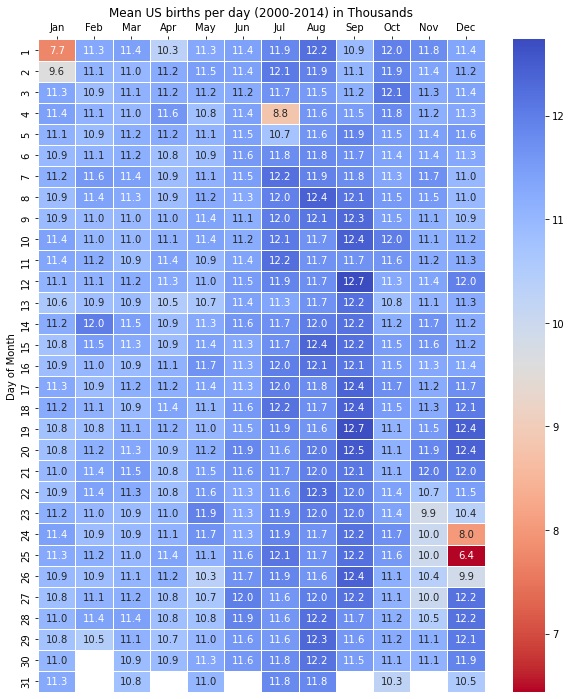With 8 billion people alive I refuse to believe there is any statistical difference between days of the year. For example according to this infographic my birthday is one of the most common but the days before and after are not?
The color scale is terrible. Here is a more credible chart based on presumably the same data by Social Security Administration, covering 62,187,024 US births (2000-2014).
Meanwhile, the post’s chart’s actual Reddit OOP is u/plotset, an account made to shill PlotSet.com, a data visualization software.
They had this to say about the data:
This data represents 4,153,303 US-born babies only between 2000 and 2014.
Top 10 Most Common: Sep 12 (0.307%) Sep 19 (0.306%), Sep 20 (0.302%), Dec 19 (0.300%), Sep 10 (0.300%), Dec 20 (0.299%),Sep 18 (0.299%), Aug 8 (0.299%), Sep 26 (0.299%), Sep 17 (0.298%)
Top 10 Least Common: Dec 25 (0.155%), Jan 1 (0.186%), Dec 24 (0.193%), Jul 4 (0.212%), Jan 2 (0.231%), Dec 26 (0.238%), Nov 23 (0.238%), Nov 25 (0.240%), Nov 27 (0.241%), Nov 24 (0.241%)
Note that the “4,153,303” figure is bullshit. It is close to births per year but does not actually correspond to the sum in any of the 15 years, nor the average.
Also, neither chart normalizes by weekday: 3 of the years in question started on Tuesday and Saturday while only 1 on Friday, causing most of the variation that got amplified by OOP’s terrible color range. (Because of leap years, I made a table of most common starting weekdays for each month; see my other comment. For example, one of the most common birthdays, August 15, was more often Wednesday or Friday than Saturday.) Without doing weird math, one can ensure the effect of weekdays is largely mitigated by using data from 28 consecutive years, which I believe can be pieced together from several good online sources but I’ll be leaving that as an exercise to the reader.
With 8 billion people alive I refuse to believe there is any statistical difference between days of the year. For example according to this infographic my birthday is one of the most common but the days before and after are not?
The color scale is terrible. Here is a more credible chart based on presumably the same data by Social Security Administration, covering 62,187,024 US births (2000-2014).

Meanwhile, the post’s chart’s actual Reddit OOP is u/plotset, an account made to shill PlotSet.com, a data visualization software.
They had this to say about the data:
Note that the “4,153,303” figure is bullshit. It is close to births per year but does not actually correspond to the sum in any of the 15 years, nor the average.
Also, neither chart normalizes by weekday: 3 of the years in question started on Tuesday and Saturday while only 1 on Friday, causing most of the variation that got amplified by OOP’s terrible color range. (Because of leap years, I made a table of most common starting weekdays for each month; see my other comment. For example, one of the most common birthdays, August 15, was more often Wednesday or Friday than Saturday.) Without doing weird math, one can ensure the effect of weekdays is largely mitigated by using data from 28 consecutive years, which I believe can be pieced together from several good online sources but I’ll be leaving that as an exercise to the reader.
So it is about average for almost all days. You have more births in fall, probably because of more sex in winter.
And it seems women really don’t want to birth on important holidays. I didn’t think that the power of will is that strong.
Don’t forget the weekdays. The total births in the dataset by weekday are:
SUN|||||||||||||||||||||||| 5886889MON||||||||||||||||||||||||||||||||||||| 9316001TUE||||||||||||||||||||||||||||||||||||||||| 10274874WED|||||||||||||||||||||||||||||||||||||||| 10109130THU|||||||||||||||||||||||||||||||||||||||| 10045436FRI||||||||||||||||||||||||||||||||||||||| 9850199SAT|||||||||||||||||||||||||| 6704495It’s not, but the power of scheduling a c-section so that you don’t spend Christmas at the hospital is.
This absolutely varies by country/culture, not drastically, but you will see different patterns
September births are more common because of christmas sex
It makes sense to pop your sprogs in spring and summer when food is more available.